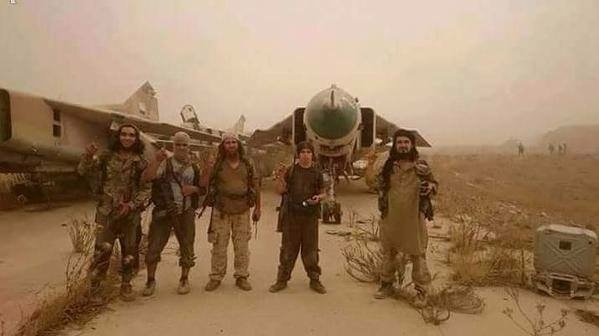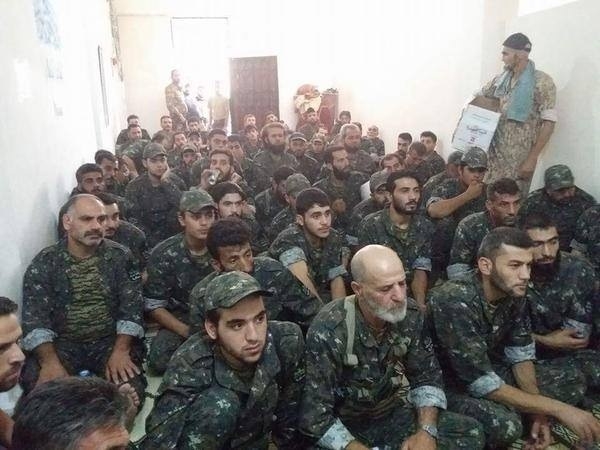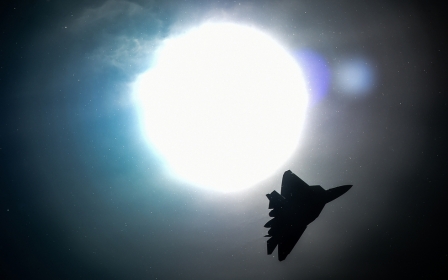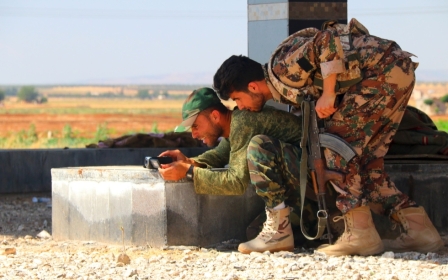Government loses control of key airbase as Nusra and IS make gains

Armed groups in Syria took advantage of the fierce sandstorm that swept through much of the Middle East this week that hindered the Syrian government from carrying out airstrikes.
Al-Qaeda's Syria affiliate, the al-Nusra Front, overran the government’s last military base in the northwest Idlib province, capturing and executing dozens of soldiers.
The UK-based Syrian Observatory for Human Rights reported that Nusra Front, along with a coalition of opposition groups, captured the Abu Duhur military airport on Wednesday.
“There were at least 56 [soldiers] killed yesterday and at least 40 taken prisoner, and dozens are missing,” said Rami Abdel Rahman, the observatory’s director.
“Some soldiers were executed,” he added.
Images uploaded on social media by the opposition groups showed helicopters and planes abandoned on the tarmac, with fighters posing seated on one of the aircrafts making a V-for-victory sign. Nusra posted pictures on Twitter of 15 men they said were Syrian soldiers who were now “in the hands of the mujahedeen”.
The Syrian government acknowledged the loss, with state television reporting that troops had left the base.
The capture of the airbase seals President Bashar al-Assad’s loss of the entire Idlib province, which is now under the control of Nusra Front and other armed opposition groups.
The observatory said that the Syrian government is now left with only three airbases in largely opposition-held territory. It still controls one in Deir Ezzor to the east, two in Neirab and Kweyris to the north near the Aleppo province. The government also controls 11 more air bases throughout Syria.
However, the Islamic State group have advanced closer to the Deir Ezzor airbase after heavy fighting with the Syrian army on Wednesday. According to the Observatory, 41 fighters were killed on both sides.
“It was one of the Islamic State’s fiercest attacks on the airport,” said Abdul Rahman.
In the fighting “18 regime soldiers and 23 Daesh fighters were killed,” he continued, using an Arabic acronym for IS.
IS fighters are now in control of a small base, used by the army’s rocket battalion, just over one kilometre away from the airport.
Abdel Rahman said the militants had used two suicide bombers in the assault, one of them a child.
IS already controls most of oil-rich Deir Ezzor province including roughly half of its capital, and has attempted to capture the airport and the rest of the city for more than a year.
If IS succeeds, Deir Ezzor would be the second provincial capital to fall to the group after the northern city of Raqqa.
The fighting, now in its fourth year, has sparked a mass exodus from Syria with millions displaced internally and millions more living in camps in neighbouring countries and hundreds of thousands trying to head north to Europe.
While the refugee crisis has been going on for years, the issue has increasingly electrified discussion in Europe.
Last week, images of three-year-old Aylan Kurdi, who drowned off the Turkish coast last week, went viral helping to prompt policy discussions on refugees. The EU Commission head has since said that the EU should take in at least 160,000 refugees on a mandatory basis.
IS, however, have now tried to monopolise the death of the toddler for their own propaganda purposes.
In the latest issue of its English-language magazine Dabiq, IS published the boy's image under the headline: "The danger of Abandoning Darul-Islam," or the land of Islam, including the group's self-declared caliphate in Syria and Iraq.
New MEE newsletter: Jerusalem Dispatch
Sign up to get the latest insights and analysis on Israel-Palestine, alongside Turkey Unpacked and other MEE newsletters
Middle East Eye delivers independent and unrivalled coverage and analysis of the Middle East, North Africa and beyond. To learn more about republishing this content and the associated fees, please fill out this form. More about MEE can be found here.





